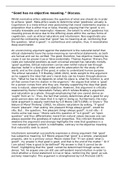“Good has no objective meaning.” Discuss.
Whilst normative ethics addresses the question of what one should do in order
to achieve ‘good’, Meta-ethics seeks to determine what ‘goodness’ actually is.
Cognitivism is a meta-ethical view postulating that moral statements express a
proposition that is either true or false, thereby arguing that the ‘good’ is uni-
versally knowable and meaningful. However, the extent to which goodness has
meaning proves divisive due to the differing views within the various forms of
cognitivism, such as ethical naturalism and intuitionism. Non-cognitivists pro-
pound the contrasting view that ‘good’ has no meaning at all, reinforcing that
the question, ‘what is good?,’ is contentious and complex, thus, it necessitates
deep examination.
An unconvincing argument against the statement is the naturalist belief that
ethical statements have the same meaning as non-ethical statements, as both
are factual and can be verified. The good, therefore, has objective meaning be-
cause it can be proven true or false evidentially. Thomas Aquinas’ Primary Pre-
cepts are naturalist positions as each universal precept has naturally morally
‘good’ qualities. Ethical naturalism can be seen within natural law through
Aquinas’ belief in a God-given order and his advocation for the study of the
world, and so the study of the good, in order to understand human purpose.
The ethical naturalist, F.H Bradley (1846-1924), lends weight to this argument
as he supports the idea that one’s moral duty can be known through observa-
tion, “What he has to do depends on what his place is, what his function is, and
all that comes from his station in the organism.” He argues that what is ‘good’
for a person comes from who they are, thereby supporting the idea that good-
ness is natural, observable and objective. However, this argument is critically
weakened by Hume’s Naturalistic Fallacy which refutes Bradley’s argument,
and naturalism as a whole, through emphasising that one cannot derive an
‘ought’ from an ‘is’. Thus, the fact that society determines what is good for any
given person does not mean that it is right in doing so. Furthermore, the natu-
ralist argument is equally restricted by G.E Moore (1873-1958), in Snare’s ‘The
Nature of Moral Thinking’ (1992), he attacks naturalism by asking, “If ‘good’
meant ‘pleasant’, then asking ‘Are pleasant things always good?’, would be
silly. But… the question, ‘Are pleasant things always good?’, is not silly - it
marks some real issue.” Moore calls this question of “is it good?” an “open
question” and thus differentiates moral from natural values because one can
always question the goodness of natural properties. This criticism therefore
weakens the argument and strongly highlights the view that goodness is a
‘non-natural’ property which is indefinable, contrary to the objective meaning
that naturalists seek to assert.
Intuitionism somewhat successfully expresses a strong argument that ‘good’
has subjective meaning. G.E Moore argues that ‘good’ is a simple, unanalysed
property, akin to a primary colour. Moore states that “If I am asked ‘what is
good?’, my answer is that good is good, and that is the end of the matter.” Or if
I am asked ‘How is good to be defined?’ My answer is that it cannot be de-
fined”, highlighting that the ‘good’ cannot be determined through sense evi-
dence. Yet, he argues one can still use self-evident moral intuition in order to
intuit whether a moral statement is true or false, reinforcing the ‘good’ as sub-
jectively meaningful. This argument is strengthened by H.A Prichard (1871-




